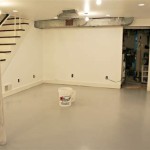Floor Paint for Concrete Basements: Essential Aspects to Consider
Are you looking to give your concrete basement floor a fresh and durable finish? Floor paint specifically designed for concrete is an excellent solution that can enhance the aesthetics and functionality of your space. However, choosing the right paint and applying it correctly are crucial for a successful outcome. This comprehensive guide will provide you with all the essential aspects to consider when selecting and applying floor paint for concrete basements.
Understanding Concrete Basement Surfaces
Concrete floors in basements can vary in condition depending on factors such as age, moisture levels, and previous treatments. Before applying floor paint, it's essential to assess the surface and address any issues that may affect the paint's adhesion and performance.
- Moisture: Concrete is a porous material that can absorb moisture from the ground or air. High moisture levels can lead to paint peeling or blistering, so it's crucial to control moisture through proper drainage and ventilation.
- pH Level: Concrete floors should have a neutral or slightly alkaline pH level between 7 and 9. Acidic surfaces can damage paint, so testing the pH level is advisable before painting.
- Surface Preparation: The surface must be clean, dry, and free of any dirt, debris, or previous coatings. Acid etching or sanding may be necessary to create a clean and rough surface that enhances paint adhesion.
Choosing the Right Floor Paint
Selecting the appropriate floor paint for concrete is essential for durability and coverage. Here are the key factors to consider:
- Type: Epoxy, latex, and acrylic floor paints are commonly used for concrete. Epoxy paints provide superior durability, while latex and acrylic paints offer ease of application and flexibility.
- Viscosity: Thicker paints provide better coverage and durability, but they may be more challenging to apply. Thin paints are easier to spread but may require multiple coats to achieve the desired finish.
- Moisture Resistance: Choose paints specifically designed to resist moisture, especially if your basement is prone to high humidity or water exposure.
- Chemical Resistance: If your basement will be used for storage or contains chemicals, consider paints with high chemical resistance to prevent damage.
- Coverage: Determine the square footage of your basement floor to calculate the paint quantity required for adequate coverage.
Application Process
Proper application is crucial for a successful floor paint job. Follow these steps:
- Surface Preparation: Clean, dry, and prepare the concrete surface as discussed earlier.
- Priming: Apply a concrete primer to improve paint adhesion and coverage.
- First Coat: Stir the paint thoroughly and apply an even coat using a roller or sprayer. Let it dry completely.
- Second Coat: If desired, apply a second coat for optimal durability and coverage.
- Curing: Allow the paint to cure according to the manufacturer's instructions, which typically ranges from 24 to 72 hours.
Maintenance and Care
To ensure the longevity of your floor paint, follow these maintenance tips:
- Regular Cleaning: Mop or vacuum the floor regularly to remove dirt and debris.
- Avoiding Heavy Loads: Avoid placing heavy objects or equipment on the floor for an extended period to prevent damage.
- Temperature Control: Maintain a consistent temperature and humidity level to prevent paint cracking or peeling.
- Repairs: If any damage occurs, repair it promptly to prevent further deterioration.
- Stripping and Repainting: If the paint becomes worn or damaged beyond repair, consider stripping and repainting the floor.
Conclusion
Transforming your concrete basement floor with paint is a rewarding project that can enhance its appearance and functionality. By understanding the essential aspects discussed in this guide, you can make informed decisions regarding the selection and application of floor paint for your specific basement conditions. Proper surface preparation, choosing the right paint, and following the application process carefully will ensure a durable and beautiful finish that will last for years to come.

Types Of Paints And Stains For Concrete Floors The Home

Types Of Paints And Stains For Concrete Floors The Home

How To Paint A Concrete Floor Southern Hospitality

How To Paint A Concrete Floor In Basement Twofeetfirst

30 Perfect Basement Concrete Floor Paint Color Ideas Painting Floors Flooring Options

Diy Painted Basement Concrete Floor In The House Of David

Basement Floor Paint Options Hgtv

7 Ingenious Painted Flooring Ideas For An Unfinished Basement

Paint And Your Waterproofed Basement Floors Tom S Waterproofing Inc

Basement Floor Coating Waterproof Flooring Paint Durall Concrete Coatings
Related Posts







